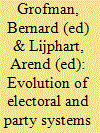|
|
|
Sort Order |
|
|
|
Items / Page
|
|
|
|
|
|
|
| Srl | Item |
| 1 |
ID:
098241


|
|
|
|
|
| Publication |
2009.
|
| Summary/Abstract |
Combining salary data for permanent non-emeritus faculty at seven departments of political science within the University of California system with lifetime citation counts and other individual-level data from the Masuoka, Grofman, and Feld (2007a) study of faculty at Ph.D.-granting political science departments in the United States, I analyze determinants of faculty salaries. For the full data set the main finding are that (1) base salaries of UC political science faculty are slightly more strongly correlated to citation rates (annualized or total lifetime citations) as a measure of research visibility than they are to seniority measured by years since receipt of the Ph.D.; and (2) that gender differences and subfield differences in salary essentially vanish once I take into account both year of Ph.D. and research visibility (as measured by annualized citation counts), while gender inequities would appear to exist if I did not control for both variables.
Bernard Grofman is professor of political science at the University of California, Irvine. In 2008 he became the inaugural Jack W. Peltason (Bren Foundation) Endowed Chair, and also director of UCI's Center for the Study of Democracy. He is co-author of four books, all published by Cambridge University Press, and editor or co-editor of 17 other books; he has published over 200 research articles and book chapters; and his work has been cited in a dozen different U.S. Supreme Court opinions. In 2001 he became a Fellow of the American Academy of Arts and Sciences.
|
|
|
|
|
|
|
|
|
|
|
|
|
|
|
|
| 2 |
ID:
050794


|
|
|
|
|
| Publication |
New York, Agathon Press, 2002.
|
| Description |
xvi, 313p.
|
| Series |
Political science series
|
| Standard Number |
0875861385
|
|
|
|
|
|
|
|
|
|
|
|
Copies: C:1/I:0,R:0,Q:0
Circulation
| Accession# | Call# | Current Location | Status | Policy | Location |
| 047867 | 342.4807/BER 047867 | Main | On Shelf | General | |
|
|
|
|
| 3 |
ID:
186676


|
|
|
|
|
| Summary/Abstract |
The greatest threat of democratic breakdown stems from the federal structure of the US Constitution and from false claims of election fraud with the potential for state- or congressional- level reversals of popular vote outcomes. The potential for such a breakdown was revealed by the events of January 6, 2021, with tens of millions of voters still believing in the big lie and the repetition of that lie by legislators and government officials. It is exacerbated by hyperpolarization, minoritarian control caused by partisan gerrymandering for state legislative districts and in the US House, malapportionment in the US Senate, and the highest likelihood of Electoral College reversals of popular vote outcomes in more than a century. Democratic breakdown is also made more likely by recent legislation that makes it easier for legislators in some gerrymandered states to reverse the outcomes of the popular vote in their states.
|
|
|
|
|
|
|
|
|
|
|
|
|
|
|
|
| 4 |
ID:
173314


|
|
|
|
|
| Summary/Abstract |
This article uses data collected from Google Scholar to identify characteristics of scholars who have chosen to create a Google Scholar profile. Among tenured and tenure-track faculty with full-time appointments in PhD-granting political science departments, we find that only 43.7% have created a profile. However, among R1 faculty, young and early-career faculty are more likely to have Google Scholar profiles than those in older cohorts. Although subfield differences are largely nonexistent, there is a notably low proportion of theory faculty with profiles and a slightly higher proportion with profiles among methodologists. Moreover, within cohorts, those who are highly cited are more likely to have profiles than those who have low citation counts. We conclude by discussing implications of our findings, the increasing usage of Google Scholar and profiles, and the increasing importance of an online presence in the academy.
|
|
|
|
|
|
|
|
|
|
|
|
|
|
|
|
| 5 |
ID:
184267


|
|
|
|
|
| Summary/Abstract |
This article builds on work by Devine and Kopko (2021) and Lacy and Burden (1999) who estimated a probit model of candidate choice from nationally representative survey data to determine the second choice of third-party voters. Using this model on 2020 election data, we show that the Libertarian candidate Jo Jorgenson probably cost Donald Trump victory in at least two states: Arizona and Georgia. Additionally, the popular-vote margin enjoyed by Joe Biden could have been between 260,000 and 525,000 fewer votes, using conservative estimates. The motivation for this article is to provide contrary evidence for two main misconceptions. First, that third-party candidates are “spoiling” elections for the Democrats. Our evidence clearly shows that third parties have the potential to hurt either of the two main parties; however, in 2020, it was Donald Trump who was hurt the most, although not consequentially. Second, some reformers believe that ranked-choice voting benefits the Democrats; again, we show that—all else being equal—in the 2020 presidential election, it was the Republicans who would have benefited by the change in rules because the majority of third-party votes went to the Libertarian candidate, whose voters prefer Republicans over Democrats 60% to 32%.
|
|
|
|
|
|
|
|
|
|
|
|
|
|
|
|
|
|
|
|
|